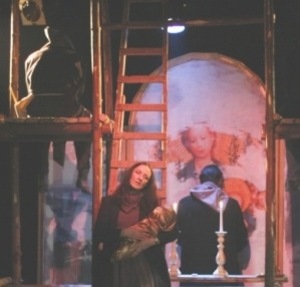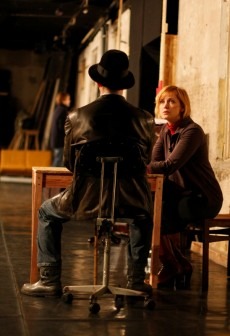END OF SEASON AT KAUNAS DRAMA THEATRE. GAP IN CLOUDS? 0
Lina Klusaitė
www.kamane.lt, 2009 05 05
Scene from the performance “Star Child”
In brief: Last season was a real test time for Kaunas State Drama Theatre. After internal problems of the troupe, it was necessary to find new methods and directions of solutions justifying the formation of new politics and repertoire, vitality of theatre as well as its necessity to itself and the audience.
Still, the biggest sceptics may take a sigh – under favourable circumstances Kaunas Drama Theatre performances and actors were noticed even in the Golden Stage Cross awards. It seems that the troupe finally found common breathing; the biggest part of the troupe had roles in performances.
“Star Child” of L.Razumovskaja and A.Obrazcov directed by Arvydas Lebeliūnas made its way to the stage with difficulty. The allegoric story was illustrated by direct Christian images; however, this increased the didactic style of the work, and the mythological content expressed in an old-fashioned form became one more manifestation of pseudo-spirituality in the contemporary society.
In the Soviet times religious images functioned in theatre as analogues of ethnic mythology testifying about the spiritual heritage of the nation as opposed to the totalitarian ideology. Meanwhile, religious symbols lost their natural attractiveness in the contemporary cynical consumer society. “Star Child” proved once again that religious images could not compete with images of mass pop culture in theatre of today. According to Treplev of A.Chekhov, new forms are needed for expressing even spiritual relations.
The efforts of A.Lebeliūnas “to reveal real values of life by Biblical motifs” were not aided by the joint forces of different actors’ schools and experiences. Still, the biggest plusses of the performance may be noticed here. In addition to young actors of A.Savickaitė’s course and experienced actors Egidijus Stancikas and Nijolė Lepeškaitė, one may see members of the troupe that step on the stage rather seldom: Albinas Budnikas, Algirdas Pintukas, Henrikas Savickis, Eugenija Bendoriūtė, Arūnas Stanionis. It is a pity that roles full of theatrical rhetoric did not move out actors this time again.
Scene from the performance "Locusts"
Some allusions to atrophy of Christian values in contemporary society may be noticed in the last premiere of this season as well – in the performance "Locusts" directed by Rolandas Atkočiūnas according to the play of the Serbian playwright Biljana Srbljanovič. Differently from the aforementioned performance, hints about Bible motifs do not become a banal illustration of Christian truths here.
Like in the play, the motif of locusts repeats the projections of a devastated spiritual place, in which homo sovieticus has appeared not by his own will today. Refusing the moralising rhetoric, the director chose the tactics which enabled to see the performance as a realised and complete artistic entity.
The place of boredom is occupied by recognition and slight irony in the performance. The Soviet experience has placed the load of inactive identity on the shoulders of a freed man. This load is shown in “Locusts” by joining fragmented lives of different stage characters. The audience may see a number of equally unhappy characters here who drown in their loneliness instead of searching for closeness, understanding or possibilities to change anything.
In general, the performance of R.Atkočiūnas based on realistic equivalents of life comes close to artistic forms that erase the border between reality and art. Tantamount roles and the suitably chosen collective of actors turn daily scenes into part of a live contact between the stage and the audience. This is aided by the clothes of actors and scenography created by Vilma Dabkienė as well as the background sounds, which act like independent effects of reality.
The truthful dramatic reality becomes one more romanticised story that neutralises the critical thinking of a spectator. The audience accepts the stage action as an action pleasant to watch inevitably, and the performance loses its critical social load. From this point of view “Locusts” comes near the dangerous border of production of popular series, when reflections of reality are multiplied according to wishes of the audience.


